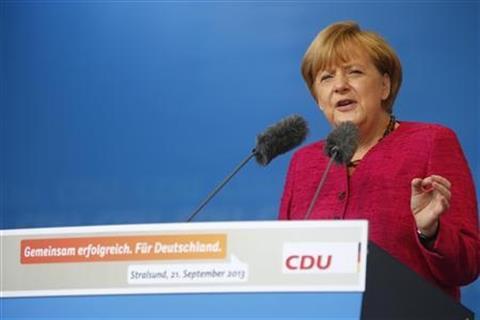BERLIN: In the first German election since Europe’s debt crisis erupted four years ago, voters are likely to give Angela Merkel a third term on Sunday, but may force her into a coalition with her leftist rivals and catapult a new anti-euro party into parliament.
The vote is being closely watched by Berlin’s European partners, with some hoping Chancellor Merkel will soften her approach towards struggling euro states like Greece if she is pushed into a ‘grand coalition’ with the Social Democrats (SPD).
But major policy shifts seem unlikely because the center-left SPD, whose campaign stalled after a gaffe-prone start by its lead candidate Peer Steinbrueck, agrees with the thrust of Merkel’s approach even as it accuses her of weak leadership.
Voting is due to begin at 8 a.m. (0600 GMT) and the first exit polls will be published at 6 p.m. (1600 GMT). Some 62 million Germans are eligible to vote. Roughly a third described themselves as undecided in the run-up to the election, adding to the uncertainty.
The most recent opinion polls show support for Merkel’s conservative bloc – her Christian Democratic Union (CDU) and the Bavarian Christian Social Union (CSU) – around 39 percent, some 13 points ahead of the SPD, the second-biggest party.
That virtually guarantees that Merkel, whose staunch defense of German interests during the crisis has sent her approval ratings soaring over 60 percent, will stay on as chancellor.
In power since 2005, the 59-year-old Protestant pastor’s daughter from East Germany has presided over a robust economy and booming labor market.
Her modest “step by step” leadership style is criticized abroad but applauded by many at home, where she was cheered as “Mutti”, or Mum, on the campaign trail.
What remains unclear is whether Merkel will be able to continue atop the center-right government she has led for the past four years. Her current partner, the business-friendly Free Democrats (FDP), has seen its support slide from a record 14.6 percent in the 2009 vote to just 5 percent in recent polls.
Unless they perform better on election day, Merkel will probably be forced to court the rival SPD, with whom she governed in a right-left coalition between 2005 and 2009.
Voters abandoned the SPD after that experiment, and there is deep resistance within the party to working with Merkel again.
Should the SPD refuse altogether, she could turn to the environmentalist Greens. A more likely scenario is that the SPD swallows its pride and agrees to talks, while demanding a high price in return for entering government with Merkel.
The party could come away with top cabinet posts such as the finance ministry and force the chancellor to accept key parts of its platform, like a minimum wage and tax hikes on the wealthy.
“They will be the most difficult coalition negotiations ever,” predicted Frank Decker, a political scientist at Bonn University.
RETURN TO DMARK
The wild card is the Alternative for Germany (AfD), a seven-month-old party that has seized on voter fears about the cost of euro zone bailouts, for which Germany, Europe’s largest economy, underwrites the biggest share.
Led by a group of renegade academics, lawyers and journalists, the AfD wants an “orderly dismantling” of the euro and says Germans should consider returning to the Deutsche Mark.
If it nudges above the 5 percent mark needed to enter parliament, it will be the first new party in the Bundestag since 1990 and the only one to favor a breakup of the euro, the currency created in 1999 and now shared by 17 countries.
“If the AfD enters parliament, it will change the euro debate in Germany,” a close aide to Merkel told Reuters.
Should the AfD win seats, Merkel could be denied her centre-right government of choice.
Speaking to 4,000 supporters at the Tempodrom arena in Berlin on Saturday, she seemed to acknowledge that risk, departing from script to urge voters to stand by the euro.
“A stable euro is not only good for Europe, it is crucial for Germany as well,” Merkel said. “It guarantees our well-being and our jobs.”
Juergen Kafke, a 63-year-old business consultant at the rally, applauded the message, saying: “I’m concerned the AfD could siphon away important votes from Merkel.”
Steinbrueck, 66, a straight-talking former finance minister, staged a final rally in Germany’s financial center Frankfurt, telling a crowd of 7,000 it was time for a change.
“In 28 hours you can get rid of them, you can get rid of the most backward-looking, incapable, loud-mouthed German government since reunification,” he said.
Even if Merkel is able to preserve her center-right government with the FDP, she will probably have to rule with a much smaller majority in the Bundestag and deal with an SPD-dominated upper house that could block major legislation,
Regardless of her coalition, she faces major challenges in a new term, from bedding down her shift from nuclear to renewable power to fending off a demographic crisis, and setting out a vision for Europe, which may be past the acute phase of its crisis but is still plagued by recession and unemployment.
“The next ruling coalition will have to spend considerable time and energy convincing German citizens about the need to further strengthen the euro, which may be particularly difficult if new rescue packages push onto the political agenda,” said Daniela Schwarzer of the German Institute for International and Security Affairs.


